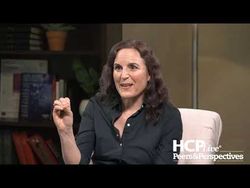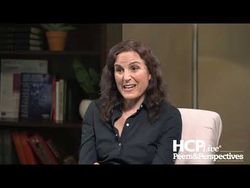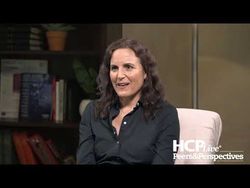Proper Nutrition in Older Patient Populations - Episode 8
Strategies to Ensure Healthy Eating in Elderly Patients
Simon D. Murray, MD: What I’m hearing you say over and over and over again is plant-based diets, the Mediterranean diet.
Jane Schwartz, RDN: Yes.
Simon D. Murray, MD: Is there a practical way that an older person living alone can get enough of those foods affordably and be able to prepare them in a way that’s practical for them?
Jane Schwartz, RDN: Yeah, sure. As we talked about, frozen fruits and vegetables are a way to go; or you could even go with packages, where you can get unsweetened applesauce or even those packets of fruit cups. Even things like that can help. Or there are a few stores now, like Costco, that are selling bulk items of things that you can keep in the freezer and that are very economical. We were talking about food ordering, like from supermarkets or online ordering, if you have a caregiver or someone or a spouse or a child who can help you order and get foods delivered. There are definitely ways to be getting it in.
Simon D. Murray, MD: Let’s talk a little about brain food. Are there certain foods that you think that there’s any evidence to suggest may help your cognitive skills or help prevent against the decline in cognitive skills?
Jane Schwartz, RDN: Yeah, sure. I think the strongest research now is with healthy fats. Things like nuts and seeds, walnuts are wonderful, almonds, pumpkin seeds, and things like avocado, olive oil. Working those types of healthy fats into the diet is really important. And then, green leafy vegetables. There’s some pretty strong evidence on those. And berries—blueberries, cherries. Again, it kind of all goes back to what’s good for the heart. You know, it’s kind of like the new brain diet. It’s almost like what we’ve been talking about is heart healthy for all these years. Because what’s going to be good for the heart is going to be good for the brain. And it’s also good for the bones. It’s almost like it all just works together. There’s not necessarily 1 special diet for 1 thing. Rather, if you’re meeting these needs for heart healthy, which most people are familiar with, you’re going to need a lot of other needs too for these disease states.
Simon D. Murray, MD: Yeah. That’s exactly what it sounds like—that it’s 1 way of eating that that helps many of your different systems.
Jane Schwartz, RDN: Exactly. This makes it easier that way.
Simon D. Murray, MD: And it also sounds as if you’re saying that you need some variety of foods in your diet.
Jane Schwartz, RDN: Yes.
Simon D. Murray, MD: I think there’s some evidence that most of us eat the same types of foods over and over again—a very select group of foods.
Jane Schwartz, RDN: Yes. I’m glad you brought that up. Especially with the elderly population, you might have someone come in and say, “Oh, you know, I have broccoli every night. I have a little bit of that.” They have the same thing. “You know, I have this canned fruit every day.” But as indicated in the tray that we will be showing, the different colors and the variety, you get different nutrients and phytochemicals from all the different colors of the fruits and vegetables and other foods. Variety is very important. Your body thrives off variety.
Simon D. Murray, MD: Yeah. The handout you did was excellent, and I think people should really take advantage of it by downloading it. But in the handout you presented, you gave some suggestions about a food list, a shopping list, and certain foods, as well as some general rules. Three veggie servings a day. Three servings of fruit a day. A source of protein. Healthy fats. It’s rather practical. I think people could do that.
Jane Schwartz, RDN: Yeah.
Simon D. Murray, MD: We’re using, in our house now, avocado oil, which I recently saw at Costco. I like it. It’s actually pretty good.
Jane Schwartz, RDN: Yes.
Simon D. Murray, MD: And I think macadamia nuts are a good source of good fats.
Jane Schwartz, RDN: Yeah. The avocado oil is good because it takes high heat. It’s a very neutral oil, so it’s not going to deliver a strong flavor like olive oil might. If you’re looking for a neutral oil, it’s a good option.
Simon D. Murray, MD: Yeah, and olive oil. Of course everybody touts olive oil, but not everybody likes it. I personally don’t. It’s got kind of a strong taste to it.
Jane Schwartz, RDN: It can.
Simon D. Murray, MD: Are there any fruits that are worse than others? Let me say that another way. If there are fruits that you’d recommend to people, would bananas be high on that list of a good fruit to eat?
Jane Schwartz, RDN: Yeah, they would. Sure. I can’t think of any fruits that I wouldn’t have somebody eat. If someone has a very severe blood sugar issue, I might limit the amount of fruits that might have a little more sugar, like having any tons of bananas or mangos or pineapple or grapes. Those may have a little more of an effect on blood sugar, but I wouldn’t necessarily eliminate them from their diet. I think there’s something to be said that you’re going to get nutrition from most fruits.
Simon D. Murray, MD: Yeah. You know, we have such a variety of foods in the grocery store now. We’re really lucky.
Jane Schwartz, RDN: Yes.
Simon D. Murray, MD: And part of that is we’ve been able to grow things in hothouses and inside. And so we can get good vegetables and fruit all year.
Jane Schwartz, RDN: Yes.
Simon D. Murray, MD: There’s not much excuse really for us not buying these items in grocery stores. And now you can have food delivered, as you said.
Transcript edited for clarity.
Jane Schwartz, RDN: Yes.



